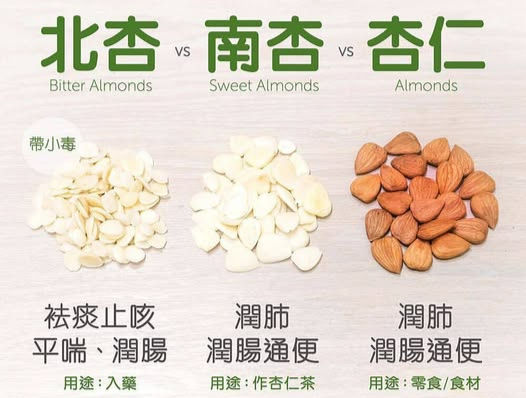Bitter Apricot Seed: Relieving Cough and Promoting Bowel Health in Traditional Chinese Medicine
- Hongji Medical

- Jun 4, 2025
- 3 min read
Bitter Apricot Seed (Ku Xing Ren), the dried mature seed of the apricot tree (Prunus armeniaca or related species), is a key herb in Traditional Chinese Medicine (TCM). Valued for its ability to relieve cough, calm wheezing, and promote bowel movements, it holds an important place in herbal therapy.
Its use was first noted in the Shennong Bencao Jing (The Divine Farmer’s Materia Medica), though early texts did not distinguish between bitter and sweet apricot seeds.
Over time, TCM scholars like Li Shizhen in the Ming Dynasty’s Bencao Gangmu (Compendium of Materia Medica) detailed its properties, noting that Bitter Apricot Seed “lubricates the lungs, stops cough, descends qi, opens blockages, disperses stagnant qi, and resolves heat-toxins.” Later works, such as Bencao Beiyao and Bencao Zhengyi, further refined its applications, expanding its clinical use.

Apricot Seed Classification
Bitter Apricot Seed (Semen Armeniacae Amarum): Used in TCM, it is bitter and contains amygdalin, which can convert to toxic cyanide in the body. It must be processed (e.g., roasted or boiled) to reduce toxicity and used in controlled doses.
Sweet Apricot Seed (Semen Armeniacae Dulce): A food-grade seed with a slightly sweet taste and lower toxicity, used in snacks or pastries. It has mild lung-moistening effects but is less potent than Bitter Apricot Seed.
Almond (Prunus dulcis): A distinct nut from a different plant, not true apricot seed, consumed for its crunchy texture and high oil and protein content.

Properties of Bitter Apricot Seed
Nature and Meridian Affinity
Taste: Bitter
Nature: Slightly warm, slightly toxic
Meridians: Lung, Large Intestine
Key Components
Bitter Apricot Seed contains amygdalin, fatty oils, and other compounds, contributing to its pharmacological effects.
Main Functions
Relieves cough and calms wheezing.
Lubricates the intestines and promotes bowel movements.
Offers cough suppression, expectorant, anti-asthmatic, and potential anti-tumor effects.
Clinical Applications
Bitter Apricot Seed is widely used in TCM for:
Relieving Cough and Wheezing: Descends lung qi to treat cough and wheezing from external pathogens or internal imbalances, particularly for cold or dry coughs.
Promoting Bowel Movements: Its fatty oils lubricate the intestines, relieving constipation due to intestinal dryness.
Resolving Phlegm: Helps clear phlegm and alleviate wheezing associated with excessive phlegm.
Other Uses: Treats lung or intestinal abscesses.
Bitter Apricot Seed in Classic TCM Formulas
Bitter Apricot Seed is often combined with other herbs in TCM formulas:
Ma Xing Shi Gan Tang (Ephedra, Apricot, Gypsum, and Licorice Decoction): Contains Ephedra (Ma Huang), Bitter Apricot Seed, Gypsum (Shi Gao), and Licorice (Gan Cao). It clears lung heat and relieves cough and wheezing from wind-heat.
San Ren Tang (Three-Nut Decoction): Includes Bitter Apricot Seed, Cardamom (Bai Kou Ren), Coix Seed (Yi Yi Ren), and others. It regulates qi and clears damp-heat, treating chest fullness and mild fever.
Run Chang Wan (Moisten Intestine Pill): Combines Bitter Apricot Seed, Chinese Angelica (Dang Gui), Hemp Seed (Huo Ma Ren), and others to lubricate the intestines and relieve constipation.
Comparison with Similar Herbs
Bitter Apricot Seed shares functions with other TCM herbs but has unique traits:
Loquat Leaf (Pi Pa Ye): Stronger at clearing lung heat and treating heat-related cough, unlike Bitter Apricot Seed’s broader application.
Aster Root (Zi Wan): Warmer and better for cold-phlegm coughs compared to Bitter Apricot Seed’s neutral nature.
Lepidium Seed (Ting Li Zi): Drains lung fluid and relieves wheezing, suited for phlegm-fluid retention, unlike Bitter Apricot Seed’s focus on cough and constipation.

Modern Applications and Research
Modern studies confirm Bitter Apricot Seed’s traditional uses:
Cough Suppression: Amygdalin inhibits the cough reflex.
Expectorant: Promotes mucus clearance from the respiratory tract.
Anti-asthmatic: Relaxes bronchial smooth muscles to ease breathing.
Anti-tumor: Preliminary research suggests amygdalin may inhibit certain cancer cells.
Clinically, it is used for bronchitis, asthma, and as an adjunct in lung cancer treatment.
Precautions for Use
Dosage: Typically 3–9 grams, adjusted based on condition and practitioner guidance.
Incompatibilities: Avoid combining with Scutellaria (Huang Qin) or Coptis (Huang Lian).
Adverse Reactions: May cause dizziness or nausea; severe cases can lead to cyanide poisoning if unprocessed or overused.
Safety: Must be processed (e.g., roasted or boiled) to reduce toxicity. Infants, pregnant women, and frail individuals should use cautiously.
Preparation: Use only processed Bitter Apricot Seed to ensure safety.
Conclusion
Bitter Apricot Seed is a vital TCM herb, prized for relieving cough, calming wheezing, and promoting bowel movements. Its long history, from Shennong Bencao Jing to modern applications, underscores its versatility in treating respiratory and digestive issues. Due to its potential toxicity, proper processing and professional guidance are essential for safe use. With ongoing research, Bitter Apricot Seed’s role in TCM and modern medicine continues to expand.




